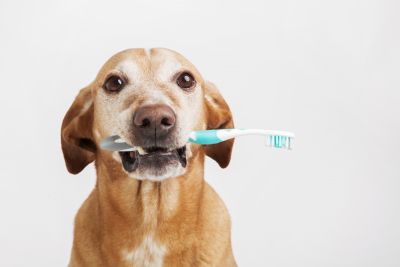
Posted By:
At Shepton Vets, we understand that your furry companions are cherished members of your family. Just like us, dogs can face dental issues that demand attention. Maintaining your dog's oral hygiene is as vital as looking after your own. Neglecting their dental care can lead to plaque buildup, which harbors harmful bacteria capable of damaging their teeth and gums. Over time, this can result in painful cavities and even tooth loss.
Why should I clean my dog’s teeth?
It’s a question we often get asked and just like us, dogs can get bad teeth and gum problems. Looking after our dog’s teeth is just as important as looking after our own. If your dog’s teeth aren’t kept clean, they can become covered with plaque. This contains bacteria which can eat into the surface of your dog’s teeth. Over time, this can cause gum problems, painful cavities and can lead to your dog losing some of their teeth.
Warning signs that your dog could have dental disease include:
Bad breath, all the time not just after meals
Yellow/ brown/grey discoloured teeth
Red or bleeding gums
Tartar builds up on teeth and sometimes discharge can be present
Difficulty eating or not wanting to eat
Dropping food from their mouth
Weight loss
Rubbing their face or drooling.There are other health issues that can cause bad breath too including kidney disease, diabetes, something stuck in their mouth or a mouth tumour (which is rare)
If your dog shows any of these signs it is important to speak to your vet so we can rule out any underlying problems and talk to you about the best treatment for your dog so you can help them feel better.
If a dental problem is identified, we will discuss a dental treatment plan tailored to your pet. This will most likely include sedation or a general anaesthetic to properly examine their mouth. Most pets will have a blood test prior to their procedure to ensure that there are no other underlying conditions and intravenous fluids (a drip) to support their circulation under anaesthetic. We take X-rays to reveal any abnormalities of the teeth and bone. Teeth are scaled and polished to remove any mineral deposits (tartar) and we chart and identify any gum abnormalities (gingivitis), worn or missing teeth and identify any teeth that may need to be extracted if dental disease is severe (such as fractured, lose or infected teeth). We then will carry out extraction of those teeth identified. Your dog will most likely need anti-inflammatory painkilling drugs and antibiotics after surgery. We then go through a regular dental care plan with you to prevent the disease from coming back.
This can include brushing your dog's teeth. It’s a good idea to start brushing your dog’s teeth when they’re young, they quite soon get used to it as part of their routine. However, it’s never too late to start, and older dogs can easily get used to a good brush up!
You can buy special brushes and toothpaste for your dog, and it is important to use pet only toothpaste, so it is safe for them to swallow. Taking things slowly is important to get them used to it.
Let them taste their new dog-safe toothpaste so they think of it as a treat.
Get them used to having their mouth touched is key. You can do this by gently rubbing a soft cloth along their gums initially. Be careful though, if your dog is not happy about this, stop! Do not get bitten!
Gradually move on to a finger brush (this is a special brush with tiny bristles to fit your finger) it gets them used to the sensation of brushing their teeth
When your dog’s comfortable and only when ready, use a proper dog toothbrush. You may stay at the finger brush stage and that is fine.In between brushes, there are other things you can do.
You can get toys that are designed to clean your dogs teeth as they chew on them. Dental chews and specialist food can help keep your dogs mouth healthy but care is needed as too many of these treats can make them overweight, likewise sugary treats can lead to obesity and can damage their teeth just like for us. Feeding your dog bones can damage your dogs teeth causing fractures. Bones can also splinter causing damage to their gums or throat or obstructions if swallowed. So, ask your vet first before feeding them.
Keeping our pets breath fresh and teeth healthy can make such a difference to them, if you are concerned about your pet, we offer free dental checks with a nurse to discuss their dental health and care and can then book to see a vet if there are any concerns and to discuss a dental treatment plan for your lovely pooch!
- Vet Jen
Your dog's dental health should never be overlooked. If you notice warning signs like bad breath, discolored teeth, or difficulty eating, it's crucial to consult our dedicated veterinary team. We'll assess your pet's oral health, develop a tailored treatment plan, and provide guidance on proper dental care. Whether it's regular brushing or specialized dental treats, we're here to ensure your dog enjoys a lifetime of fresh breath and healthy teeth. Reach out to us for a free dental check with our nurse and take the first step toward your pup's brighter smile!
Whilst on my visits I have been having several discussions...
As our feline friends get older there are a few conditions...
Another winter discussion group season is now behind...
©2024 Shepton Veterinary Group Ltd., All rights reserved.
Privacy Policy • Terms & Conditions • Cookie Policy